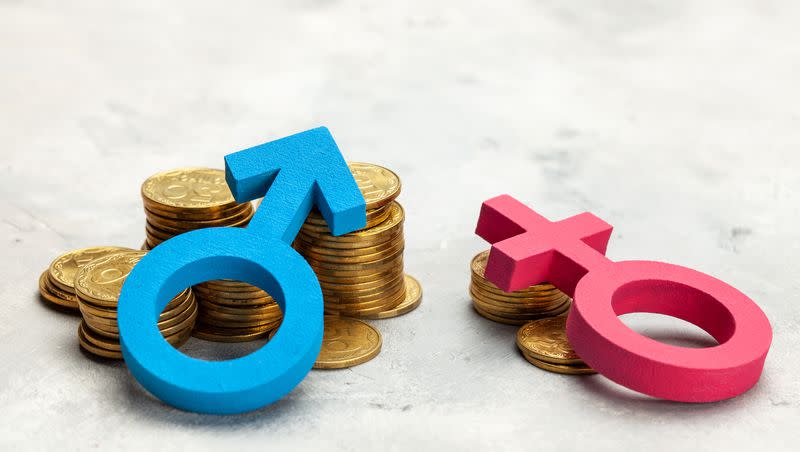Opinion: Latest data on women’s equality raises questions for Utah

In August of every year, WalletHub publishes its update of the best and worst states for women’s equality. I tend to brace myself for the worst, but I did not expect the gap between Utah and the next worst state to significantly widen. For nine years running, Utah has ranked as the worst state when it comes to women’s equality. And, in WalletHub’s 2023 findings just released, we are not only ranked as the 50th of 50 states yet again, but Utah’s score has decreased and the gap between us and the next worst state has widened.
As I walk you through the results, it is important to note that the data sources WalletHub uses — for example, the U.S. Census Bureau, Bureau of Labor Statistics, U.S. Equal Employment Opportunity Commission and the Centers for Disease Control and Prevention — are typically a couple of years behind. However, I do expect that with so many organizations and individuals joining forces with A Bolder Way Forward just launched, we’ll be making progress in the next few years.
WalletHub groups its findings into three main categories (workplace environment, education and health, and political empowerment) with 17 key indicators that are each weighted differently. With a possible total of 100 points, Utah had 29.85 points in 2021, 31.22 points in 2022, and now in 2023 we are only 19.43. This is not good news. In addition, the gap between Utah and the next worst state has increased significantly. In 2021, we were 7.52 points behind Idaho, and in 2022 we were 12.77 points behind Georgia. Now in 2023, we are 22.11 points behind Texas, 23 points behind Idaho, and 25.52 points behind Georgia.
I was able to get more in-depth data from WalletHub than was published in its recent report.
Let me share what I found.
Related
Workplace environment
Utah currently ranks 49th for the “Workplace Environment” category (we were 44th in 2021 and 48th in 2022), which is worth 40 of the 100 points. I have not included the actual points for each, but instead their rankings (1=Best state; 50=Worst state) for 2021, 2022 and 2023.
Income disparity: 2021=45, 2022=50, 2023=50.
Higher-income disparity: 2021=48, 2022=49, 2023=50.
Disparity in share of executive positions: 2021=46, 2022=46, 2023=48.
Disparity in share of minimum-wage workers: 2021=1, 2022=1, 2023=1.
Unemployment-rate disparity: 2021=26, 2022=1, 2023=34.
Entrepreneurship-rate disparity: 2021=39, 2022=43, 2023=49.
Disparity in average number of work hours: 2021=50, 2022=50, 2023=50.
Job security disparity: 2021=1, 2022=29, 2023=1.
Economic security disparity: 2021=3, 2022=3, 2023=3.
Disparity in poverty rate: 2021=3, 2022=6, 2023=4.
The most concerning areas for me include income disparity (gender pay gap), higher-income disparity, executive position disparity and the decrease in the entrepreneurship-rate disparity. It is important to remember that our rankings go down when other states make progress.
Education and health
Utah ranks 50th in “Education and health” (40 points), which was where we were ranked for many years. This category is the sum of the following three key indicators.
Disparity in advanced educational attainment: 2021=50, 2022=50, 2023=50.
Disparity in math test scores: 2021=43, 2022=43, 2023=50.
Disparity in doctor-visit affordability: 2021=41, 2022=33, 2023=45.
Although I’m concerned about all of these, I am deeply saddened by the significant drop in the disparity in math test scores in eighth grade. This means that girls are significantly lower (when compared to boys) on math scores, particularly when compared to other states. It’s disappointing to see that math scores for both boys and girls in Utah are low. To me, this is hitting a crisis level, as confidence and competence in math and related elements (e.g., finances) are directly tied to so many life-impacting decisions such as, among others, college major choices, career choices and decisions to leave abusive relationships.
Political empowerment
And finally, Utah now ranks 49th on the “Political empowerment” category (20 points) — which goes back to where we were ranked in 2021 (we were 42nd in 2022):
Disparity in share of lawmakers in the U.S. Senate: 2021=21; 2022=21, 2023=22 (all states with no women are ranked at 22).
Disparity in share of lawmakers in U.S. House of Representatives: 2021=37; 2022=37, 2023=37 (all states with no women are ranked at 37).
Disparity in share of lawmakers in state legislature: 2021=40; 2022=37, 2023=40.
Disparity in share of state-elected executives: 2021=39; 2022=30; 2023=36.
Research continues to show that women in political office are more likely to advocate for public policies around education, health, poverty and family issues. Things change when there are more equal percentages of men and women serving in elected offices at all levels.
Although WalletHub’s rankings are not the end-all in how Utah is doing when it comes to women’s treatment, representation and advancement, it is one important piece of the puzzle in helping us better understand not only the status of women in Utah, but also the experiences of many women who live and work in our state.
Understanding where we are is the key to targeted, strategic improvements. We must do better! I welcome all Utahns to be engaged in changing things in Utah. Improving things for girls and women doesn’t mean that we are lifting them at the expense of boys and men — that is the scarcity mentality. I believe that there is enough for everyone through cooperation and collaboration, which is the abundance mentality. When we strengthen the impact of Utah girls and women, we can strengthen everyone!

